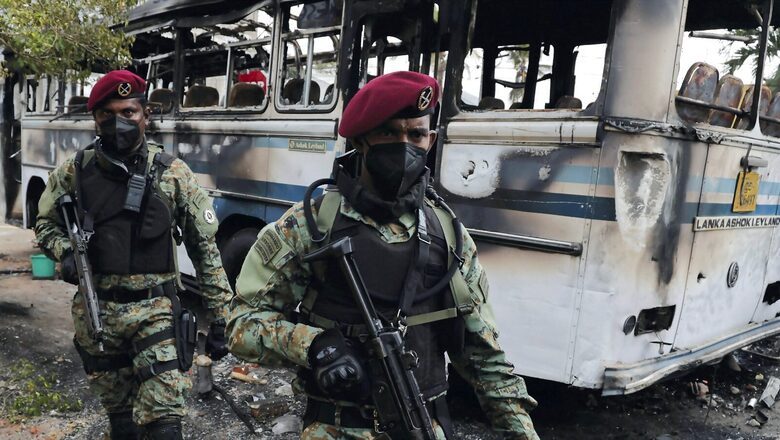
views
Sri Lanka's government imposed a weekend curfew on Saturday, even as hundreds of lawyers urged President Gotabaya Rajapaksa to revoke a state of emergency introduced following unrest over fuel and other shortages in a deep economic crisis.
The government's information department said a countrywide curfew would run from 6 p.m. (1230 GMT) on Saturday to 6 a.m. (0030 GMT) on Monday.
Rajapaksa introduced a state of emergency on Friday, raising fears of a crackdown on protests. Emergency powers in the past have allowed the military to arrest and detain suspects without warrants, but the terms of the current powers are not yet clear.
The Indian Ocean island nation of 22 million people is grappling with rolling blackouts for up to 13 hours a day as the government scrambles to secure foreign exchange to pay for fuel and other essential imports.
"People take to the streets when things are impossible," 68-year-old Colombo shop owner Nishan Ariyapala told Reuters TV. "When people take to the streets the political leaders of the country must act thoughtfully."
Rajapaksa said the state of emergency was needed to protect public order and maintain essential supplies and services.
Angered by the shortages of fuel and other essential items, hundreds of protesters clashed on Thursday with police and the military outside Rajapaksa's residence as they called for his ouster and torched several police and army vehicles.
Police arrested 53 people and imposed a curfew in and around Colombo on Friday to contain other sporadic protests.
Shops opened and traffic was normal on Saturday, while police remained stationed at some petrol stations.
'FAILURE TO UNDERSTAND'
"There has been a failure to understand the aspirations of the people and to empathize with the suffering of the people of the country," the lawyers, members of the Bar Association of Sri Lanka, said in their appeal, adding that freedom of speech and peaceful assembly should be respected.
Reacting to the state of emergency, U.S. ambassador to Sri Lanka Julie Chung said: "Sri Lankans have a right to protest peacefully – essential for democratic expression.
"I am watching the situation closely, and hope the coming days bring restraint from all sides, as well as much needed economic stability and relief for those suffering," she tweeted.
Highlighting the severe shortage of foreign currency, a vessel carrying 5,500 metric tonnes of cooking gas had to leave Sri Lankan waters after Laugfs Gas, the company that ordered it, could not procure $4.9 million from local banks to pay for it.
"People are struggling with an acute shortage of cooking gas, but how can we help them when there are no dollars? We are stuck," Laugfs Gas Chairman W.H.K. Wegapitiya told Reuters.
The ongoing crisis – the result of economic mismanagement by successive governments – has been compounded by the COVID-19 pandemic, which has hit tourism and remittances.
It has also marked a sharp turnaround in political support for Rajapaksa, who swept to power in 2019 promising stability.
The government has said it is seeking a bailout from the International Monetary Fund and loans from India and China.
In the first major food aid to the country since Colombo secured a credit line from New Delhi, Indian traders have started loading 40,000 tonnes of rice.
Sri Lankan Man Says His Activist Son Abducted by Police After Emergency Declared
A Sri Lankan man on Saturday alleged that his son, who is a social media activist, has been abducted by the police after President Gotabaya Rajapaksa declared a state of emergency amidst protests over the country's worst economic crisis. Anurudda Bandara's father said that his son was taken away by someone from the north Colombo police station of Modera on Friday night.
According to the police, he was wanted to be questioned over his social media activities. The incident came after President Rajapaksa declared a state of emergency in a bid to counter public protests against the government.
The emergency was declared as the island nation braced for country-wide protests on Sunday against the government's poor handling of the ongoing economic crisis where people currently endure long hours of power outages and scarcity of essentials. Bandara's father said the inquiries he had made with the police station concerned had denied that he was in their custody.
Upon a complaint lodged with the Human Rights Commission by the Young Journalists' Association, it has been revealed that Bandara is being questioned by the police elsewhere. His questioning came ahead of a planned civil society protest on Sunday which has been organised through social media to carry out a nationwide protest against the government for its handling of the ongoing economic crisis.
Bandara, it was said, had acted as the admin of a social media campaign which demanded the resignation of the president and his government. In an apparent reaction to the protest, the government imposed a state of emergency which would among other things make all gatherings unlawful.
Meanwhile, the Bar Association of Sri Lanka urged for the rescinding of the special gazette which proclaimed the state of emergency. They urged the President to ensure that fundamental rights which are aspects of the sovereignty of the people are respected and protected and not violated by the state or its agents.
On Thursday night, a large demonstration opposite the private residence of Rajapaksa led to mass scale arrests. They held placards calling Gota go home', blaming him for the hardships. Sri Lanka is currently experiencing its worst economic crisis in history. With long lines for fuel, cooking gas, essentials in short supply and long hours of power cuts the public has been suffering for weeks.
Rajapaksa has defended his government's actions, saying the foreign exchange crisis was not his making and the economic downturn was largely pandemic driven where the island's tourism revenue and inward remittances waning.
Read the Latest News and Breaking News here




















Comments
0 comment